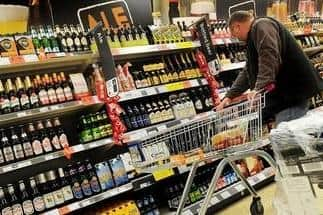Sales decline at Morrisons as food price inflation hits new high of 17.1 per cent
The Bradford-based supermarket saw sales decline by 0.9 per cent in the four weeks to February 19, 2023, but it was the firm's best performance since May 2021, according to the new figures.
Tesco edged slightly ahead in the battle between Britain’s biggest retailers, with sales up by 6.6 per cent. Sainsbury’s and Leeds-headquartered Asda were just behind with sales rising by 6.2 per cent and 5.9 per cent respectively.
Advertisement
Hide AdAdvertisement
Hide AdAldi remains the fastest growing grocer pushing its market share to a new record high of 9.4 per cent, with sales rising 26.7 per cent, closely followed by Lidl, which increased sales by 25.4 per cent taking its market share to 7.1 per cent.


Frozen food specialist Iceland also won share, taking 2.4 per cent of market sales, up from 2.3 per cent last year as spending through its tills increased by 10.8 per cent.
Overall take-home grocery sales increased by 8.8 per cent during the four weeks and by 8.1 per cent over the 12-week period.
The rise in inflation means that households face an £811 increase to their average annual bill if they buy the same items.
Advertisement
Hide AdAdvertisement
Hide AdBut it didn’t stop people from celebrating Valentine’s Day this year with steak sales up a quarter in the run up to February 14, while sparkling wine sales doubled, and an additional £5m was spent on boxed chocolates.
Fraser McKevitt, head of retail and consumer insight at Kantar, said: “Shoppers have been facing sustained price rises for some time now and this February marks a full year since monthly grocery inflation climbed above four per cent.”
He added: "Our latest research shows that grocery price inflation is the second most important financial issue for the public behind energy costs, with two-thirds of people concerned by food and drink prices, above public sector strikes and climate change.
"One quarter say they’re struggling financially, versus one in five this time last year.
Advertisement
Hide AdAdvertisement
Hide Ad"The numbers speak for themselves. If people don’t change how they buy their groceries, households are facing an £811 increase to their average annual bill.”
Supermarkets and shoppers are adapting to manage rising prices. “The battle to offer best value for consumers continues in this intensely competitive sector, particularly as the traditional retailers look to protect market share from the discounters,” Mr McKevitt said.
"Own label ranges have been one obvious focus and shoppers have consistently bought them over brands since February last year.
"Sales of these lines are up by 13.2 per cent this month, well ahead of branded products at 4.6 per cent, a trend that shows little sign of stopping.”
Advertisement
Hide AdAdvertisement
Hide AdRecently shoppers have also been navigating shortages in the fruit and vegetable aisles.
Mr McKevitt said: “Some supermarkets have been restricting the number of salad and vegetable packs customers can buy due to supply chain issues.
"Though not captured in this data set, we’ll be closely following the impact of these shortages on sales in the coming weeks.”